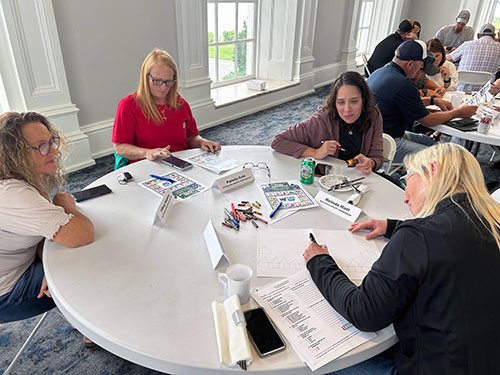At a September Kentucky Rural Water Association conference held at the iconic Louisville Water Tower, leaders from rural water utilities across Kentucky learned about the power and importance of communications. Louisville Water communications and community engagement professionals trained attendees on how to connect with their communities and keep their customers apprised of what is happening with their water.
 At the heart of the conference was an interactive, group exercise that brought water utility leaders together for a hands-on experience in collaboration. Each team was tasked with designing an imaginary town, using only the water resources available in a fictional geographic area.
At the heart of the conference was an interactive, group exercise that brought water utility leaders together for a hands-on experience in collaboration. Each team was tasked with designing an imaginary town, using only the water resources available in a fictional geographic area.
Kelley Dearing Smith, Louisville Water’s Vice President of Communications and Marketing, said the activity helps water leaders think more directly about their customers and their everyday needs.
“Building a town based on a limited supply of water forces you to think about the critical users of water,” Dearing Smith said. “What is the highest priority for water service? What can you not do without? This experiment also brings out your personal experience and is rooted in culture. For example, in doing this experiment with a rural crowd, nearly everyone puts a farmer on the map, but most don’t include a hospital since care is often regionalized.”
This creative exercise highlighted the critical role water plays in shaping a community’s growth and development. Participants had to consider not only the availability of water but also how best to distribute it to sustain their town’s population, agriculture, and businesses. Additionally, leaders had to weigh public safety concerns – fire hydrants play a big role in keeping communities safe. But for every gallon dedicated to fire hydrants, that meant a gallon of water taken away from important things like new businesses that could help the community grow, or schools that can help build the town’s workforce for the future.
The real challenge came when groups were faced with limited resources, pushing them to think critically about how to communicate water scarcity or restrictions to their fictional communities. How would they engage with customers to ensure water conservation? What role would public education play in managing expectations? These were just some of the vital questions that leaders explored.
Kentucky Rural Water Association Board President and Daviess County Water Commissioner Christina O’Bryan said that the activity underscored just how important water is to every community in Kentucky.
“If you were ever to choose where you want to live, one of the first things to consider is ‘What is the water source?’” O’Bryan said. “We just need to be mindful about how water is provided to our communities and communicate with our customers about their water.”
This hands-on activity helped attendees experience the importance of clear communication and forward-thinking community engagement strategies. By working through real-world water management challenges in a simulated environment, these water utility leaders gained invaluable insights that they could bring back to their own communities—strengthening the trust and transparency between their utilities and their customers.
For more than 20 years, Louisville Water has offered this training course to Kentucky Rural Water Association. And, attendees found the training very useful. O’Bryan said she learned a lot about how to improve her utility’s connection with its customers, and that it served as a reminder of the important things for her to consider as a water professional.
“We just need to be mindful that we are a provider of safe, reliable drinking water,” O’Bryan said. “We want to promote public health and economic development and protect our environment and all of our neighbors.”

